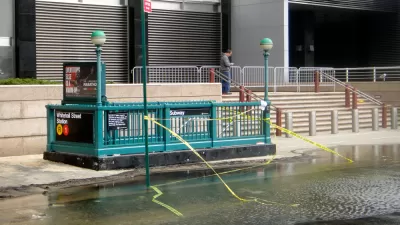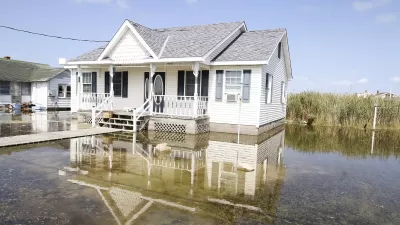The worsening effects of extreme weather events are accelerating the deterioration of critical infrastructure, leaving communities more vulnerable.

Writing in Axios, Andrew Freedman highlights the urgency of building resilient infrastructure in a changing climate. Pointing to recent examples of flooding, fires, and heat waves devastating communities across the country, Freedman writes, “This summer has demonstrated again and again that our infrastructure is not sufficient to withstand the changed climate of today, let alone the impacts on the horizon.”
“We have long designed our infrastructure as if the climate conditions and extremes of the past, such as the definition of a 100-year, 500-year or even 1,000-year flood in a particular location, would hold true in the future.” But predictive models about climate change may not accurately capture the rate of change, Freedman notes. “Some climate scientists and activists raise the possibility that climate change is already resulting in surprises missing in their models, such as the breaching of the once unthinkable temperature of 104°F (40°C) in the U.K., for example.”
With extreme heat waves becoming more likely, fires growing more powerful, and floods affecting more places, upgrading and replacing aging infrastructure must happen at a much faster pace than previously thought.
FULL STORY: We haven't built for this climate

Planetizen Federal Action Tracker
A weekly monitor of how Trump’s orders and actions are impacting planners and planning in America.

Maui's Vacation Rental Debate Turns Ugly
Verbal attacks, misinformation campaigns and fistfights plague a high-stakes debate to convert thousands of vacation rentals into long-term housing.

San Francisco Suspends Traffic Calming Amidst Record Deaths
Citing “a challenging fiscal landscape,” the city will cease the program on the heels of 42 traffic deaths, including 24 pedestrians.

Defunct Pittsburgh Power Plant to Become Residential Tower
A decommissioned steam heat plant will be redeveloped into almost 100 affordable housing units.

Trump Prompts Restructuring of Transportation Research Board in “Unprecedented Overreach”
The TRB has eliminated more than half of its committees including those focused on climate, equity, and cities.

Amtrak Rolls Out New Orleans to Alabama “Mardi Gras” Train
The new service will operate morning and evening departures between Mobile and New Orleans.
Urban Design for Planners 1: Software Tools
This six-course series explores essential urban design concepts using open source software and equips planners with the tools they need to participate fully in the urban design process.
Planning for Universal Design
Learn the tools for implementing Universal Design in planning regulations.
Heyer Gruel & Associates PA
JM Goldson LLC
Custer County Colorado
City of Camden Redevelopment Agency
City of Astoria
Transportation Research & Education Center (TREC) at Portland State University
Jefferson Parish Government
Camden Redevelopment Agency
City of Claremont





























